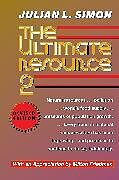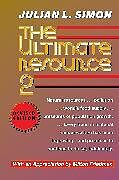The Ultimate Resource 2
Einband:
Kartonierter Einband
EAN:
9780691003818
Untertitel:
Englisch
Genre:
Volkswirtschaft
Autor:
Julian Lincoln Simon
Herausgeber:
University Presses
Anzahl Seiten:
784
Erscheinungsdatum:
21.07.1998
ISBN:
978-0-691-00381-8
"Julian Simon, an economics professor, systematically, shockingly, irresponsibly explodes each and every foundation of the whole environmental movement. And he does so with so many facts, graphs and examples that it would be a strange person who could walk away from reading this book without his or her faith in the assumptions of the environmental movement being just a little bit shaken up. . . . This is a magnificent book with the power to change minds."---Matt Ridley, The Sunday Telegraph
Autorentext
Julian L. Simon, until his death in 1998, was Professor of Business Administration at the University of Maryland and a Senior Fellow at the Cato Institute. Among his books are Population and Development in Poor Countries: Selected Essays (Princeton), The Economic Consequences of Immigration to the United States, Population Matters: People, Resources, Environment, and Immigration, and The State of Humanity.
Klappentext
Arguing that the ultimate resource is the human imagination coupled to the human spirit, Julian Simon led a vigorous challenge to conventional beliefs about scarcity of energy and natural resources, pollution of the environment, the effects of immigration, and the "perils of overpopulation." The comprehensive data, careful quantitative research, and economic logic contained in the first edition of The Ultimate Resource questioned widely held professional judgments about the threat of overpopulation, and Simon's celebrated bet with Paul Ehrlich about resource prices in the 1980s enhanced the public attention--both pro and con--that greeted this controversial book. Now Princeton University Press presents a revised and expanded edition of The Ultimate Resource. The new volume is thoroughly updated and provides a concise theory for the observed trends: Population growth and increased income put pressure on supplies of resources. This increases prices, which provides opportunity and incentive for innovation. Eventually the innovative responses are so successful that prices end up below what they were before the shortages occurred. The book also tackles timely issues such as the supposed rate of species extinction, the "vanishing farmland crisis," and the wastefulness of coercive recycling. In Simon's view, the key factor in natural and world economic growth is our capacity for the creation of new ideas and contributions to knowledge. The more people alive who can be trained to help solve the problems that confront us, the faster we can remove obstacles, and the greater the economic inheritance we shall bequeath to our descendants. In conjunction with the size of the educated population, the key constraint on human progress is the nature of the economic-political system: talented people need economic freedom and security to bring their talents to fruition.
Zusammenfassung
Presents a concise theory for the observed trends: population growth and increased income put pressure on supplies of resources. This book tackles issues such as the supposed rate of species extinction, the 'vanishing farmland crisis,' and the wastefulness of coercive recycling.
Inhalt
Analytical Contents 1The Amazing Theory of Raw-Material Scarcity 2Why Are Material-Technical Resource Forecasts So Often Wrong? 3Can the Supply of Natural Resources - Especially Energy - Really Be Infinite? Yes! 4The Grand Theory 5Famine 1995? or 2025? or 1975? 6What Are the Limits on Food Production? 7The Worldwide Food Situation Now: Shortage Crises, Glut Crises, and Government 8Are We Losing Ground? 9Two Bogeymen: "Urban Sprawl" and Soil Erosion 10Water, Wood, Wetlands - and What Next? 11When Will We Run Out of Oil? Never! 12Today's Energy Issues 13Nuclear Power: Tomorrow's Greatest Energy Opportunity 14A Dying Planet? How the Media Have Scared the Public 15The Peculiar Theory of Pollution 16Whither the History of Pollution? 17Pollution Today: Specific Trends and Issues 18Bad Environmental and Resource Scares 19Will Our Consumer Wastes Bury Us? 20Should We Conserve Resources for Others' Sakes? What Kinds of Resources Need Conservation? 21Coercive Recycling, Forced Conservation, and Free-Market Alternatives 22Standing Room Only? The Demographic Facts 23What Will Future Population Growth Be? 24Do Humans Breed Like Flies? Or Like Norwegian Rats? 25Population Growth and the Stock of Capital 26Population's Effects on Technology and Productivity 27Economies of Scope and Education 28Population Growth, Natural Resources, and Future Generations 29Population Growth and Land 30Are People an Environmental Pollution? 31Are Humans Causing Species Holocaust? 32A Greater Population Does Not Damage Health, or Psychological and Social Well-Being 33The Big Economic Picture: Population Growth and Living Standards in MDCs 34The Big Picture II: LDCs 35How the Comparisons People Make Affect Their Beliefs about Whether Things Are Getting Better or Worse 36The Rhetoric of Population Control: Does the End Justify the Means? 37The Reasoning behind the Rhetoric 38Ultimately - What Are Your Values? 39The Key Values Conclusion. The Ultimate Resource Epilogue. My Critics and I Notes References Index

Leider konnten wir für diesen Artikel keine Preise ermitteln ...
billigbuch.ch sucht jetzt für Sie die besten Angebote ...
Die aktuellen Verkaufspreise von 6 Onlineshops werden in Realtime abgefragt.
Sie können das gewünschte Produkt anschliessend direkt beim Anbieter Ihrer Wahl bestellen.
Loading...
Die aktuellen Verkaufspreise von 6 Onlineshops werden in Realtime abgefragt.
Sie können das gewünschte Produkt anschliessend direkt beim Anbieter Ihrer Wahl bestellen.
| # | Onlineshop | Preis CHF | Versand CHF | Total CHF | ||
|---|---|---|---|---|---|---|
| 1 | Seller | 0.00 | 0.00 | 0.00 |
